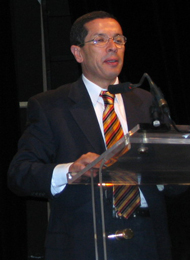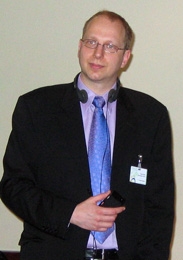| Web archives: Monday, 21 March Monday, 22 March
| Wednesday, 23 March Highlights: |
|
 |
|
|
| |
| Closing the Forum, Ahmed Ameur, Secretary-General, MATEE, said that he was satisfied that the goals and objectives of the Forum had been met. He noted that the massive response to the Forum, which attracted over 400 participants, including twelve ministers, from 60 countries, had demonstrated the international community's commitment to sustainable development in the water and energy sectors. He said the Forum represented another phase in the implementation of the WSSD JPOI.
Azzam Alwash, the Iraq Foundation, presented the outcomes from sessions on water and sanitation partnerships. He reported that partnerships can: contribute to understanding of the costs associated with service delivery and provide support for social pricing and facilities such as micro credit and discounts; facilitate user involvement in decisions on the adoption of appropriate technologies; contribute complementary skills; and inform policy and regulation to support technological innovation to reduce costs.
Susan McDade, UNDP, presented the outcomes from sessions on energy partnerships. She noted the role of partnerships in accessing and promoting renewable energy, and stimulating energy efficiency at the industrial and domestic levels. On the negative side, she reported on the pressures and sense of urgency around issues of access caused by rising energy prices, climate change and environmental change. She noted that the time is ripe for energy, given the inclusion of the issue in the agenda for CSD-14 and CSD-14 and the opportunity to link energy to health, education, gender, poverty and environmental sustainability in discussions at the forthcoming UN Millennium Summit.
|
| |
|
| |
| |
| |
|
|
| Malini Mehra, International Partnerships Coordinator, UK Department for Environment, Food and Rural Affairs,
Azzam Alwash, the Iraq Foundation, Taha Balafrej, Director, Department of Partnerships cooperation and Coordination, Ministry of territorial Planning, Water and Environment, Morroco,
Ahmed Ameur, Secretary-General, MATEE, and Anne Kerr, Department of Social and Economic Affairs
Malini Mehra reported on lessons and outcomes from Forum sessions on the partnering process. On cross-sector linkages, she highlighted the challenges of working with different stakeholders, and noted that cross-sector linkages and community engagement require continuous work and creative communication. She added that effective partnerships require up-front investment and regular reviews.On governance, she cited the need for clear and specific goals within partnerships, and respect for diversity, noting that dfferent governance models are appropriate in different circumstances.
In his concluding remarks, Chair Balafrej stated that the Forum had paved the way for CSD-13 and invited all partners to continue to exchange information. He expressed a hope that a third forum would be convened next year to help institutionalize the partnership process. He invited participants review materials from Forum sessions at the event's official website: www.moroccoforum.org.
Anne Kerr, UN-DESA, noted preparations for the Partnership Fair at CSD-13 and observed that the nature of deliberations and innovative formats at the Forum could not have taken place in a formal UN setting. She also thanked the Government of Morocco and all who had contributed to the Forum's success. |
|
| On Demand Workshops |
|
|
| |
|
Workshop on Information Systems for Partnership Communication and Knowledge Management: Kristina Vilimaite, overviewed her Regional Environmental Center for Central and Eastern Europe 's knowledge management system. Other participants described their own systems (left) (kvilimaite@rec.org; http://www.rec.org) and
Darian Stibbe, Partnership Central (right) (stibbe@partnershipscentral.org; http://partnershipscentral.org), opened the workshop by asking participants to discuss their own experiences designing and using knowledge management systems, associated challenges, and what makes a good information system |
| |
|
 |
|
|
|
|
| |
|
|
| On Demand Workshop on ICID's Initiative on Water for People and Food: A participant inquired about the impacts of international trade on future food security (left) M. Gopalakrishnan, International Commission on Irrigation and Drainage (ICID)
(icid@icid.org; www.ciid.org.in), moderated the session. |
|
|
| |
| Francophone Sustainable Development Information System (Médiaterre): Abdeslam Dahman Saïdi, IEPF, Francophone Environmental and Energy Institute (IEPF) (left) , presented on Médiaterre, a francophone global information system for sustainable development.
(a.dahman@targa-aide.com; a.dahman@menara.ma; www.mediaterre.org)
Workshop on a Sustainable Development Initiative:
Fanny Calder, Chatham House (right), facilitated an 'on-demand' workshop on a proposal from Moussa Ibrahim Moussa from the Ministry of State for Environmental Affairs, Egypt, that an institute for sustainable development be established for African countries. |
|
| Informal on Clean Fuels and Vehicles: Partnership Status Update and Discussion of Next Steps |
|
| This meeting provided a background on the Partnership for Clean Fuels and Vehicles, Fuels Practices and Trends in Different Regions, a Summary of the Beirut 2004 Seminar on Fuels and Vehicles. The meeting also provided an opportunity for participants to share their thoughts and ideas on the following topics: What are the current actions being taken to eliminate leaded gasoline, reduce sulfur levels in gasoline and diesel, adopt or clean vehicles technologies?; In an effort to exchange experiences, what successful actions have been taken that might be of interest to others? Have there been awareness campaigns, stakeholder dialogues, or public-private ccooperative efforts that have been effective?; and What action steps are recommended to move forward? What are the needs and issues that need to be addressed? What concrete proposals should be advanced in the near-term? |
|
|
| |
| Rob de Jong, UNEP (rob.jong@unep.org), with Moderator Kathleen Abdallah, UN DESA (abdallak@un.org; www.un.org/esa/desa) and Yahia Sabhi, MATEE |
|
|
| |
|
|
Informal Partnership Meeting: Renewable Energy and Energy Efficiency Partnership (REEEP)
www.reeep.org |
|
| |
| Marianne Moscoso-Osterkorn, International Director, REEEP (left) and Alfred Ofosu-Ahenkorah, Deputy Chairman of Ghana Energy Foundation |
| |
|
| Miscellaneous Photos |
|
|
|
| Heather Creech, IISD (left) |
|
| |
| Peter Doran and Alexis Conrad, ENB writers (left) and Naima Oumoussa and Sahibi Abdelfettah, Ministry for Territorial Planning, Water and Environment, Morocco |
|
| |
| Simon Bouzgan, MATEE (left) |
|
|
|
|
Leaded petrol phaseout status maps (left) and Taha Balafrej, Director, Deparatment of Partnerships Cooperation and Coordination, Ministry of Territorial Planning, Water and Environment, Morocco, being interviewed after the conclusion of meeting |
|
|
|
|